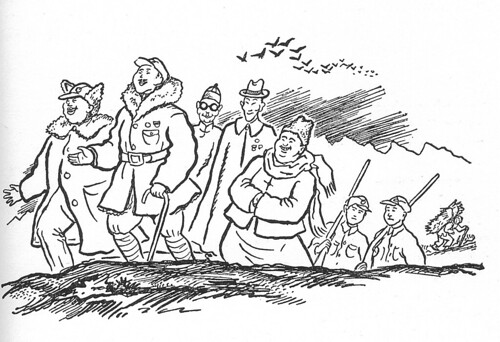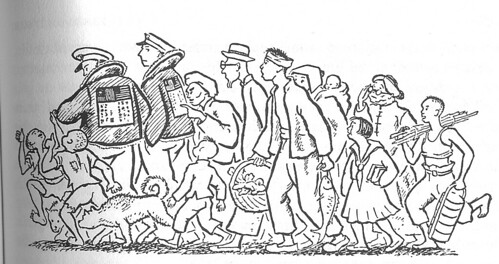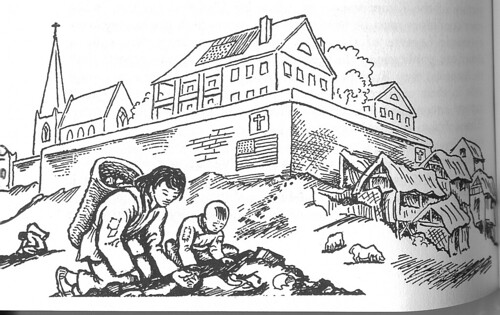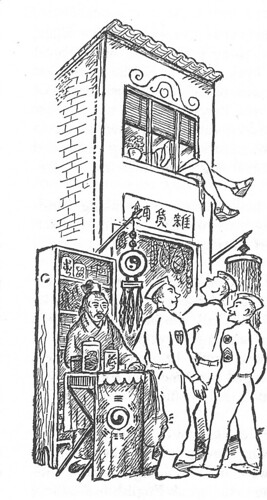Graham Peck’s Two Kinds of Time has been re-issued. This is good news for everyone, and especially for those of us who got a copy for Christmas. (Thanks Sis!) For a number of years all that one was likely to find even in used bookstores was the Sentry edition (1967), which re-printed only the first half of the book. The two parts of the book are the same in that they are both the stories and pictures of Peck’s wanderings in Western China during the War of Resistance. The first volume ends on December 10th, 1941, when a group of local officials come to visit him. Peck has been fairly contemptuous of Kuomintang officials throughout the book, since he regards most of them as corrupt feudal remnants with at best a thin layer of modern jargon spread over them. They in turn are convinced he must be some sort of crypto-Communist. On this occasion however they are happy to inform him that 500 American planes have bombed Tokyo and that they are now allies.

The illustrations are one of the joys of the book. Peck himself said in the introduction to the 1967 half-edition that this was a good place to split the book, and he seems to be right. The first half is about the decrepit nature of the Nationalist system and Peck has a nice eye for the contradictions of China’s attempts to modernize and the absurdities of Western attempts to help the process along.
After America enters the war, however, Peck will start working for the OWI and the book is about America’s first great attempt to remake a foreign country. This is one of the things that I think makes the second part pretty topical, given that Americans are still in the middle (well, the end of the middle) of an attempt to re-make a large Asian nation. Peck is deeply critical of the American government’s decision to bind themselves hand and foot to whatever Chiang Kai-shek’s government wanted to do, and to our general and continuing ignorance about China. 1 He is a bit more charitable about American attempts to explain themselves to the Chinese.

He also spends a lot of time talking about what might be called the American Green Zone in China, which he is much less impressed with, either in its old missionary form or its new military form.

Peck’s analysis of the geopolitical situation in China is interesting, even if I don’t always agree with it. What is striking me most at present, however, are his accounts of ordinary Americans encountering “China”.

American troops were in general not interested in the Wisdom of the East, and Americans were often contemptuous of the Chinese they met. They were more than happy to uplift the Chinese, and to put a great deal of effort into doing it, but they seem to have expected the process to be easier than it turned out to be. One flyboy complained to Peck about his inability to get a date.
“At that Mayor’s party last month I met four or five girls who could speak English, and they gave me their phone numbers. A couple weeks ago I came into town at noon. I was sick of those dirty squabs in the hotels, and I just wanted to take a nice girl to the best restaurant in town, buy her a dinner and talk to her, the way you would at home….I called up every one of those girls and they all gave me the run-around. I got so mad I decided if I couldn’t have a good time myself, I’d give one to somebody who needed it. I picked up the worst-looking beggar I could find, and took him to a restaurant to get him just as fine a meal as I would have ordered for a girl. What d’you think happened?..The manager threw us out! Said his restaurant would lose face if it served beggars, even in a private room. After that I went right back to the airfield without any dinner. I was so fed up with the Chinese I didn’t want their food.” p.538
The poor American just wants to sit down and eat with a date, something he regards as entirely natural, but in China it’s not, and he can’t understand why. Frustrated in his attempt he decides to help out a poor beggar and flip the bird to Chinese Culture, and finds that he can’t do those either.
To some extent this ties in with many of the Chinese people Peck had been talking to. Many of them are Chinese liberals who very much wanted to turn their compatriots from peasants to modern Chinese, but are frustrated by their inability to change them or even to make contact. Many of the them just give up. Probably the best example is a Chinese woman he meets who is in charge of a local adult-education effort and, being a graduate of the LSE, impresses Peck with her detailed plans and multi-colored charts, but has been forced to close down all the schools because “the peasants were much too ignorant. “
Giving up is not always an option for the Chinese, of course, but the Americans always had the option of heading back to the airbase for the duration and then trying to forget China as rapidly as possible once they got home. The pattern of wild enthusiasm for re-making the world, followed by confusion, followed by wanting to forget the whole thing seems to be an American standard. Peck’s book is in some ways not an ideal guide to China in the 1940’s, but it is an excellent guide to the eternal and unchanging nature of the Americans.
After all, soon China will be just like Kansas City, so there is not much point in learning about the soon to be vanished past. ↩
“Eternal and unchanging nature of the Americans”… I’m not sure this is intended to be a joke, but nonetheless it’s very funny. And spot-on. If only we’d learn…
Sometimes we do in fact remake the world, or at least parts of it.
“Two Kinds of Time” is the best book about China I have read in a long time, or maybe ever. I had just finished “Through the Great Wall,” which had been gathering dust on my shelves for years, and was so enchanted by it, I tracked down TKT, not knowing it had been reissued. (I scored a signed first edition! For a price. And I have not regretted it.) Great writer, great observations, inpiring, timeless, topical. This guy was a treasure; but what happened to him in the 50s? Did he just become obscure? I just bought the 1968 “China: The Remembered Life,” but what was he doing between TKT and that? I’d sure like to know. Not a lot of information out there about that. (Maybe it’s in The Remembered Life.)